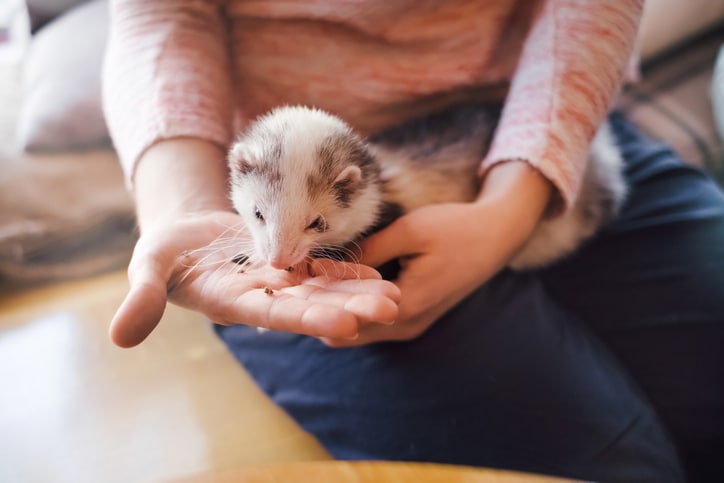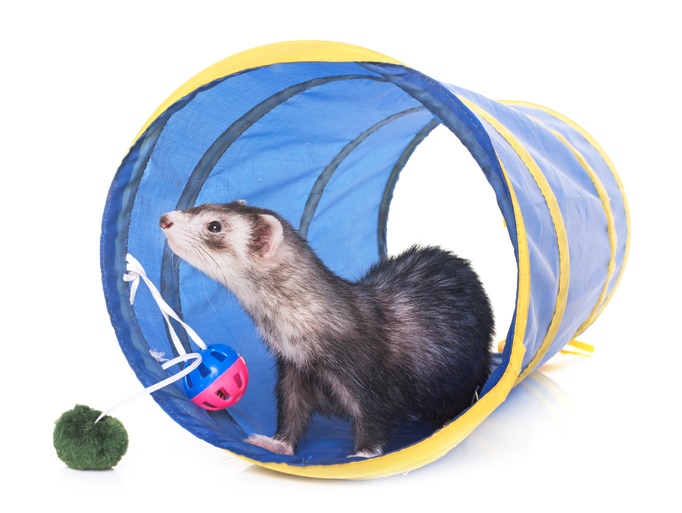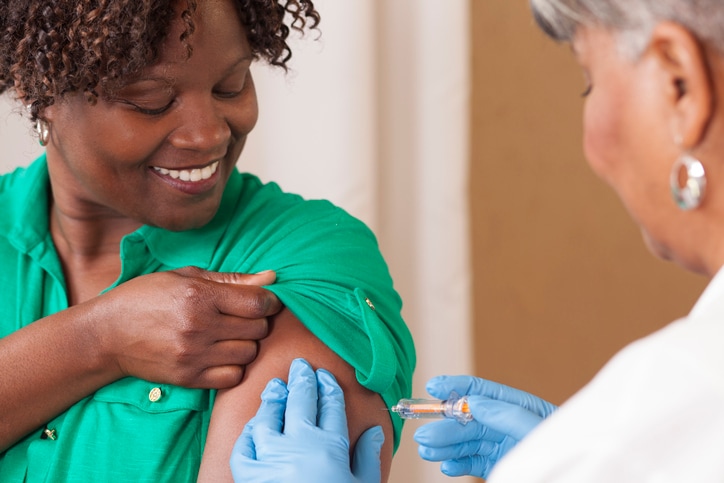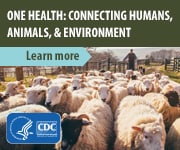Ferrets

Ferrets have become common household pets in the United States, and their curious and friendly nature makes them suitable pets for many. Ferret owners should be aware that although ferrets can make good pets, they can sometimes carry germs that can make people sick. Ferrets are also not recommended for homes with children under 5 years of age because of the increased risk of injury from bites.
Although rare, germs from ferrets can cause a variety of illnesses in people, ranging from minor skin infections to serious illnesses. One of the best ways to protect yourself from getting sick around ferrets is to thoroughly wash your hands with running water and soap after handling ferrets, their food, or items in their enclosures.
By providing your ferret with routine veterinary care and following the Healthy People tips, you are less likely to get sick or injured interacting with a ferret.
Read below to learn about the most common diseases caused by ferrets and visit the Healthy People section to learn about staying healthy around pet ferrets.
Campylobacter are bacteria that can make people and animals sick with a disease called campylobacteriosis.
How it spreads: Campylobacter most often spreads to animals and people through the feces (poop) of infected animals, contaminated food or water, or the environment. People can become infected if they don’t wash their hands after touching a ferret or its poop, food, toys, or habitat.
Who is at risk: Anyone can get a Campylobacter infection, but children younger than 5 years old, adults 65 and older, and people with weakened immune systems are more at risk for serious illness.
Signs in ferrets: Ferrets that are young or have weak immune systems may be more likely to get a Campylobacter infection. Ferrets may show no signs, or they may have diarrhea (that may be bloody), lack of appetite, vomiting, or fever.
Symptoms in people: People with Campylobacter infection can have diarrhea (often bloody), fever, and abdominal cramps. The diarrhea may be accompanied by nausea and vomiting. Symptoms usually start within 2–5 days after infection and last about 1 week.
Cheyletiellosis is a mild skin infection caused by parasitic mites feeding on skin cells.
How it spreads: Cheyletiellosis is spread through contact with animals that have the mites (for example, ferrets, rabbits, cats, and other animals).
Who is at risk: Anyone can get cheyletiellosis, but it’s rare.
Signs in ferrets: These mites typically don’t cause disease in ferrets, but if affected ferrets may have hair loss, dandruff, or itching because of skin irritation from the mites. Adult mites may be easily seen on an affected ferret. They are often white and may look like “walking dandruff” if observed moving.
Symptoms in people: These mites typically don’t cause disease in people, but symptoms can include itching, redness, and raised bumps on parts of the skin that touched the animal. The inflammation caused by the mites is usually mild, short-term, and goes away on its own.
Giardia is a parasite that can be found on surfaces or in water, food, or soil that has been contaminated by the poop of an infected person or animal.
How it spreads: Giardia spreads through swallowing microscopic poop containing the parasite after contact with an infected person or animal, or by drinking water or eating food that has been contaminated with poop from infected people or animals.
Who is at risk: The risk of getting Giardia from ferrets is unknown. Anyone can get Giardia, but the following groups have a higher risk:
- International travelers
- People who have contact with children in diapers
- People who have contact with poop during sexual contact with someone who is infected with Giardia
- People who drink untreated water from a river, lake, stream, or spring
- People who swim in natural bodies of water.
Signs in ferrets: Some ferrets with Giardia may not seem sick, so it’s important to wash your hands after playing with ferrets and to take your ferret to the vet regularly.
Symptoms in people: People with Giardia may experience diarrhea, gas, abdominal discomfort, nausea, and vomiting. However, it is possible to be infected and have no signs of illness.
Influenza, or “flu”, is a contagious respiratory illness caused by influenza viruses that infect the nose, throat, and sometimes the lungs. Flu viruses that commonly spread among people (human seasonal flu) can also affect ferrets. Other (non-human) flu viruses are found in different animal species, such as chickens and pigs, but these flu viruses are not known to circulate among ferrets.
How it spreads: Flu spreads through droplets when coughing, sneezing, or talking. You can also get flu by touching a surface or object with the flu virus on it and then touching your mouth, nose, or possibly eyes. People can spread the flu to ferrets through droplets made when coughing, sneezing, or talking, or through direct contact (touching). Animals and people infected with flu viruses may be able to spread flu to others before they develop symptoms. There are no reports of flu spreading from ferrets to people, but because ferrets can get sick with human flu viruses, it may be possible for them to spread flu viruses to people.
Who is at risk: Anyone can get sick with flu, but children younger than 5 years old, pregnant women, adults 65 and older, and people with certain chronic conditions or weakened immune systems are at high risk of developing serious flu complications. Getting a seasonal flu vaccine every year can help prevent flu and reduce the risk of serious flu complications.
Signs in ferrets: Ferrets are very susceptible to human flu. Ferrets with flu can have a variety of symptoms, including fever, thick clear or dried discharge from their nostrils, sneezing, coughing, decreased appetite, and weakness. There is no flu vaccine for ferrets. A veterinarian can help develop a treatment plan if your ferret gets the flu.
Symptoms in people: People with flu can have fever, cough, sore throat, runny or stuffy nose, muscle or body aches, headache, or tiredness (fatigue). Because flu can spread from people to ferrets, people who may be sick with flu should not be around ferrets. If contact with your pet while you are sick is unavoidable, use a face mask and gloves to prevent the spread of flu. Also, wash your hands before and after interacting with your ferret.
Rabies is a deadly neurologic disease caused by a virus that spreads primarily through bites of infected animals. Ferret owners should get ferrets vaccinated against rabies.
How it spreads: Rabies spreads through contact with saliva or brain/nervous system tissue from an infected animal, usually through scratches or bites.
Who is at risk: Rabies in people and domestic animals is rare in the United States because of successful animal control and vaccination programs, but the disease is still found in wild animals such as bats, foxes, raccoons, and skunks. You or your pet could be at risk for rabies if you come into contact with an infected animal.
Signs in ferrets: Ferrets with rabies often have a sudden change in their behavior followed by progressive paralysis. Animals with rabies typically die within a few days after symptoms start.
Symptoms in people: Symptoms of rabies in people can appear days to months after exposure. Once symptoms appear, it is almost always too late for treatment, so if you have been bitten by a ferret or another animal, you should wash the wound immediately and see a doctor right away.
Ringworm is an infection caused by fungus that can infect the skin, hair, or nails of people and animals.
How it spreads: Ringworm spreads through direct contact with an infected animal or person (touching), or from the environment.
Who is at risk: Anyone can get ringworm.
Signs in ferrets: Kits (baby ferrets) and young ferrets are most commonly affected by ringworm and can have circular areas of hair loss anywhere on their bodies.
Symptoms in people: Ringworm can affect skin on almost any part of the body as well as fingernails and toenails. The symptoms of ringworm often depend on which part of the body is infected, but they generally include itchy skin, ring-shaped rash, red, scaly, cracked skin, and hair loss.
Salmonella are bacteria that can make people and animals sick with a disease called salmonellosis.
How it spreads: People can become infected with Salmonella by eating contaminated food, or through contact with animal poop or an animal’s food. Salmonella infection in ferrets is usually associated with feeding them raw or undercooked meat or unpasteurized milk.
Who is at risk: Anyone can get a Salmonella infection, but children younger than 5 years old, adults 65 and older, and people with weakened immune systems are more at risk for serious illness.
Signs in ferrets: Salmonella infections are not common in ferrets. However, ferrets that do have an infection can have diarrhea (that can be bloody), conjunctivitis (red eyes), and anemia (low red blood cell count).
Symptoms in people: People with a Salmonella infection may experience diarrhea, fever, and abdominal cramps. Symptoms usually start 6 hours–4 days after infection and last 4–7 days.
How to stay healthy around pet ferrets
Before adopting or buying a pet ferret, make sure a ferret is the right type of pet for your family. Be aware that ferrets can sometimes spread germs that can make people sick. Young children are also at higher risk for bites from ferrets and should never be left unsupervised around ferrets. Because of this, ferrets might not be suitable pets for certain households. Ferrets are not legal to own in some areas, so make sure to check local laws before adopting a buying a pet ferret.

Wash your hands
- Wash your hands with soap and running water:
- After contact with ferrets
- After contact with ferret saliva or poop
- After handling your ferret’s food or supplies
- Adults should supervise hand washing for children under 5 years of age.
- Use hand sanitizer if soap and water are not readily available.
Prevent ferret scratches and bites
Germs can spread from ferret bites and scratches, even if the wound does not seem deep or serious. Ferret bites can become seriously infected or spread rabies, especially if the ferret is unvaccinated and has had contact with a rabid animal. Young children are especially at risk for bites from ferrets.
How to prevent ferret bites and scratches
- Avoid bites and scratches from ferrets. Ferret bites can become seriously infected or spread rabies, especially if the ferret is unvaccinated.
- Be cautious with unfamiliar animals. Approach ferrets with care, even if they seem friendly.
- Do not play roughly with ferrets, especially when they are young. This will lead to fewer scratches and bites as animals become older.
- Always supervise children around ferrets.
What to do if you are bitten or scratched by a ferret
Many types of germs can be spread from animal bites and scratches, even if the wound does not look very bad. Unvaccinated ferrets are at risk for rabies and can spread rabies to you if they become infected.
If you are bitten or scratched by a ferret, you should:
- Wash the wound with warm, soapy water immediately.
- Seek medical attention if:
- If you are unsure if the ferret has been vaccinated against rabies.
- If the ferret appears sick or is acting unusual.
- The wound or injury is serious (uncontrolled bleeding, unable to move, extreme pain, muscle or bone is showing, or the bite is over a joint).
- The wound or site of injury becomes red, painful, warm, or swollen. (Especially if the person bitten is 5 years of age or younger, elderly, pregnant, or has a weak immune system.)
- It has been more than 5 years since your last tetanus shot.
- If you were bitten by a ferret you don’t know, report the bite to animal control or your local health department.
- If possible, contact the owner and ensure the animal has a current rabies vaccination. You will need the rabies license number, name of the veterinarian who administered the vaccine, and the owner’s name, address, and phone number.
- Make sure a veterinarian sees the ferret and contact your local health department if the ferret becomes sick or dies shortly after you were bitten.

Keeping your ferret healthy helps to keep you and your family healthy. To learn how to stay healthy around pet ferrets, visit the Healthy People section.
Before choosing a ferret
- Check your state, local, and property laws before choosing or buying a ferret. Just because you can buy a pet doesn’t mean that it is legal to own it in your city, state, or property.
- Research and learn how to properly care for your ferret before purchase. Ask your veterinarian or pet store staff about the proper food, care, and enclosure or environment that is best for the ferret you are selecting.
How to choose a ferret
- Pick a ferret that is bright, alert, and active.
- Ferrets should have a glossy coat free of stool. If any animals in a cage look sick, do not choose a pet from that cage.
- Signs of illness in a ferret include appearing sluggish or depressed, having diarrhea, abnormal breathing, and fluid running from its eyes or nose.
- Consider having a veterinarian examine your new ferret before you finalize the purchase or adoption to ensure that it is healthy.
- After selecting your new pet, make sure to take your new ferret to the veterinarian within a few days to a week after adoption for a health visit.
- If your ferret becomes sick or dies soon after purchase or adoption, take it to the veterinarian promptly, and inform the pet store, breeder, or rescue organization about the pet’s illness or death.

How to house your ferret
- Because of their curious nature, ferrets can be escape artists. House your ferret in a cage that can be securely closed and/or locked.
- Keep your ferret out of the kitchen and other areas where food or drink is prepared or consumed. Do not eat or drink while handling your pet.
- Make sure your ferret has access to food and fresh water every day.
- Do not allow your ferret to roam unsupervised.
- Wash your hands thoroughly with soap and water after handling ferrets or their food, cages, or bedding. Hand washing will reduce the risk of germs spreading from your ferret to you and your family.
- Avoid bites and scratches from ferrets by learning how to approach and hold your pet safely.
- Always use disposable gloves or plastic bags when cleaning up poop from your pet. Be careful to peel off the gloves inside out so you do not touch the outside. Wash your hands thoroughly afterwards.

Monitor your ferret’s health
- Take your ferret to a veterinarian every year, or if it seems sick. Veterinarians who focus or specialize in small mammals, including ferrets, can provide extra guidance on caring for your pet.
- Talk to the veterinarian about rabies vaccination.
- Examine your ferret daily, looking for any changes in activity level, appetite, or overall health. Specifically, look for:
- Sluggish or depressed behavior
- Dull hair coat
- Loose stool (poop)
- Discharge from the eyes or nose
- Abnormal breathing
- These signs could mean your ferret is sick. If your ferret appears sick or shows these signs, contact your veterinarian immediately.
- Be aware that ferrets can shed Salmonella and other germs. Avoid contact with animal poop and urine because it can make you sick.
- Wash your hands thoroughly with soap and water after feeding or cleaning up behind ferrets. Be sure to help children wash their hands.
- If you become sick shortly after purchasing or adopting a ferret, tell your doctor about your new pet.

Ferrets and influenza (flu)
Ferrets can be infected with influenza A and B viruses (human flu), just like people. People can spread flu to ferrets, and it’s possible that ferrets may be able to spread flu to people. If you have a pet ferret at home, you should:
- Get a yearly flu vaccine.
- There is no vaccine for flu in ferrets, so the best way to protect your pet is to protect yourself from flu.
- Avoid contact with your pet ferret if you or any members of your household have flu symptoms.
- Prevent family members with flu from interacting with pet ferrets while sick. Consider having a friend, neighbor, boarding facility, or veterinarian care for your pet ferret while those in your household recover from the illness.
- If contact with your pet while you are sick is unavoidable, use a face mask and gloves to prevent the spread of flu. Also, wash your hands before and after interacting with your ferret.
- If you have multiple pet ferrets, isolate sick ferrets from the others promptly. Contact your veterinarian immediately to evaluate the health of your ferrets and discuss how to prevent the spread of flu to your other pet ferrets.
Selecting and caring for a pet ferret
- Selecting a ferret
American Veterinary Medical Association - Pet Travel
USDA-APHIS
Staying healthy around ferrets
- 4 Tips to Stay Healthy Around Your Pet
- Adopt these healthy pet habits
- Stay Healthy Around Small Pets
- Administration of Rabies Vaccination State Laws
Includes PDF table of laws by state. American Veterinary Medical Association - How to Stay Healthy around Pets
Podcasts
Guidance and recommendations
- Compendium of Measures to Prevent Zoonotic Diseases Associated with Non-Traditional Pets
- Prevention and Control of Seasonal Influenza with Vaccines: Recommendations of the Advisory Committee on Immunization Practices-United States, 2018-19 Influenza Season
- CDC ACIP Vaccine Recommendations
